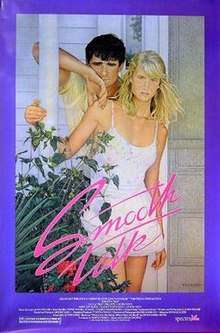Smooth Talk
Smooth Talk is a 1985 American drama film directed by Joyce Chopra, loosely based on Joyce Carol Oates' 1966 short story Where Are You Going, Where Have You Been?, which was in turn inspired by the Tucson murders committed by Charles Schmid. The protagonist and main character, Connie Wyatt, is played by Laura Dern. The antagonist, Arnold Friend, is played by Treat Williams.
| Smooth Talk | |
|---|---|
 Theatrical release poster | |
| Directed by | Joyce Chopra |
| Produced by | Martin Rosen |
| Screenplay by | Tom Cole |
| Based on | Where Are You Going, Where Have You Been? by Joyce Carol Oates |
| Starring | |
| Music by | Russ Kunkel Bill Payne |
| Cinematography | James Glennon |
| Edited by | Patrick Dodd |
| Distributed by | American Playhouse Goldcrest Films |
Release date |
|
Running time | 96 minutes |
| Country | United States |
| Language | English |
| Box office | $16,785[2] |
The film was produced by American Playhouse and Goldcrest Films, and originally released to movie theaters in 1985. The original music score was composed by Russ Kunkel and Bill Payne. The movie won the Grand Jury Prize in the Dramatic category at that year's Sundance Festival.
Plot
Connie Wyatt is a restless 15-year-old who is anxious to explore the pleasures of her sexual awakening. Before she enters her sophomore year in high school, she spends the summer moping around her family farm house. She suffers from her mother's put-downs, while hearing nothing but praise for her older sister, June. Her father somehow manages to float around the family tensions. She also helps paint the cottage, just as her mother constantly demands her to.
Connie passes the time cruising the local shopping mall with her friends and flirting with boys. When an actual date leads to heavy petting, however, she flees from the boy's car. At a hamburger joint, an older man confides to her, "I'm watching you!" and proves it soon after. One afternoon, her mother and June warn Connie to be careful with her flirting, and she is left alone in the house, while her family goes to a barbecue.
Later, as Connie is playing around the house, a man who calls himself Arnold Friend approaches her in a 1960s convertible with that name painted on it and identifies himself as "A. Friend". He dresses and acts like James Dean, and name-drops several teenybopper acts, even though he is much older than she is. He comes off very kind and friendly, but a bit suspicious, alternating between talking to her in a warm, seductive voice and shouting insults to his fellow car passenger when he asks Arnold if he should "pull out the phone," possibly to keep her from calling the police. Arnold tells Connie about how he has been watching her and that he knows all about her, recounting the details about her family's barbecue plans with amazing accuracy. He then starts talking about how he could be her lover. She starts to get scared and tells him to go, but he coerces her into going with him, threatening to burn down the house, while his friend remains at the house, supposedly to watch over it while they are gone.
When she returns home, Connie is bewildered and disheveled, and tells Arnold that she never wants to see him again. It is left ambiguous whether or not he raped her; it is implied that she isn't the same person she was at the beginning of the film. After her family returns home, her mother tearfully apologizes to her for slapping her earlier that day, but Connie reassures her that everything is all right. At the end of the film, she doesn't tell June about what happened, but dances with her to James Taylor's recording of the song "Handy Man."
Cast
- Treat Williams as Arnold Friend
- Laura Dern as Connie
- Mary Kay Place as Katherine
- Margaret Welsh as Laura
- Sara Inglis as Jill
- Levon Helm as Harry
- Elizabeth Berridge as June
- Geoff Hoyle as Ellie
- William Ragsdale as Jeff
- David Berridge as Eddie
- Cab Covay as Pick-up driver
- Michael French as Stan
- Joy Carlin as Laura's mother
- Mark McKay as Bobby King
- Carl Mueller as Mall Boy
Production
Filming of Smooth Talk took place in northern California in the cities of Sebastopol and Santa Rosa.[1]
Reception
Goldcrest Films invested £516,000 in the film and received £635,000 earning them a profit of £119,000.[3]
Home media
The film was released on DVD by Metro-Goldwyn-Mayer Home Entertainment in 2006.[4] On November 24, 2015, Olive Films released the film on Blu-ray.[5]
References
- "Smooth Talk". AFI Catalog of Feature Films. American Film Institute. Archived from the original on February 19, 2019.
- "Smooth Talk". Box Office Mojo. Retrieved February 20, 2019.
- Eberts, Jake; Illott, Terry (1990). My indecision is final. Faber and Faber. p. 657.
- "Smooth Talk DVD". Amazon. Retrieved February 20, 2019.
- "Smooth Talk (Blu-ray)". DVD Talk. Archived from the original on February 19, 2019.
External links
| Awards | ||
|---|---|---|
| Preceded by Blood Simple |
Sundance Grand Jury Prize: U.S. Dramatic 1986 |
Succeeded by Waiting for the Moon |